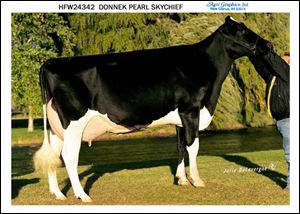
Claims of `cownap' caper spur stampede of ill will
1/17/2003
Pearl, a prize-winning cow that has appeared on the cover of national magazines, is pregnant and in seclusion in Ohio. The animal is the subject of state and federal inquiries.
URBANA, Ohio - Pearl is a Canadian beauty, a quiet young thing whose prize-winning perfection graced national magazine covers.
But her involvement with two men, Ohio dairy farmer Chris Nelson and Canadian Holstein breeder John Martin, has embroiled the corn-fed gal in international intrigue - midnight border crossings, alleged kidnapping plots, even murder threats.
Today, she is pregnant and living in seclusion, the focus of state and federal investigations. She won't talk. She simply dozes in her stall, chewing cud. By all accounts, Pearl is happy now, still one of the finest Holstein heifers on the hoof.
Meanwhile, the men in her life exchange verbal barrages from across the border.
“He stole Pearl. Cownapped her. Took her right from my barn,'' said Mr. Martin of Woodstock, Ont.
“Nonsense,” said Mr. Nelson, who runs a dairy farm in this western Ohio city 100 miles south of Toledo. “I didn't take her. I bought her, but he refused to give her back after she got pregnant. How she got back here, who knows?”
Two years ago, Pearl was the queen of the Royal Winter Fair in Toronto and the World Dairy Expo in Wisconsin. Her conformation was as near-perfect as the judges had seen.
“She was like a movie star,'' Mr. Martin said.
He happily sold Pearl to Mr. Nelson for $65,000.
Mr. Nelson said he did not mind paying so much for a world-class heifer whose face had graced the covers of industry magazines. Back in Ohio, he hoped she would find a new career creating similarly comely calves. Her bloodline could mean hefty profits, he assumed.
But Pearl did not get pregnant. So Mr. Nelson turned to Mr. Martin, who agreed to help him - for a price. Mr. Martin and his veterinarian friend, John Draper, bought a 10 percent interest in Pearl. She was shipped back to the Canadian farm in February, 2002.
That's when the trouble started.
Mr. Nelson wanted Pearl returned to Ohio. But Mr. Martin said that was out of the question. Shipping a pregnant cow is dangerous, he said. Besides, he did not trust the American. Mr. Nelson allegedly made statements that made the breeder think he might have plans to kill the cow “for insurance money.”
“He told us that if she had trouble giving birth and didn't look good anymore, that's what insurance is for,” the Canadian said, “so we were worried.”
Mr. Nelson said the allegations are unfounded.
“This is no ordinary cow. Why would I pay $65,000 to kill her? That's just nonsense. A bunch of wild stuff they've made up,” he said.
Days turned into months. The arguments continued.
By November, Mr. Nelson was fed up. He filed suit in Canadian court, asking for custody of Pearl. But a judge ruled in Mr. Martin's favor, saying Pearl should stay where she was until the men dissolved their legal partnership - a process that could take months.
Everything changed on Jan. 10. Pearl disappeared.
Mr. Martin called police. He knew who did it, he said: Mr. Nelson.
Meanwhile, Mr. Nelson said, he woke up to find Pearl grazing in his farm field. He said he thought Mr. Martin had finally seen things his way and returned the cow.
“All I know is that she showed up on my farm. So I called up John and said, `Thanks for sending Pearl home,'” he said. And now that she's “home,” he has no plans to send her back to Canada.
Federal and state authorities want to find out how the cow slipped past the border. The Ohio Agriculture Department has quarantined Pearl until USDA investigators arrive at Mr. Nelson's farm next week.
“We have a lot of questions,” said Melanie Wilt, an Ohio Agriculture Department spokesman. All animals crossing the border must be inspected for disease and have the proper paperwork.
“You just can't take any animal across the border,” Mr. Martin said. “You just don't put it in a truck. There's all type of health regulations from the United States, when you bring a cow here, and when we take one into the United States. It's for everybody's protection. That's how we keep diseased animals out of this country and that's how you keep diseased animals out of your country.”
Possession is three-fourths of the law, even if Mr. Martin and his friend own one-tenth of the cow, Mr. Nelson said. And she's content.
“Why would I send her back there?” he asked. “She's very happy here. She has everything she needs.”